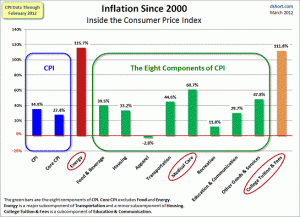
When to Leave the 'Academia' (University Cartel)?

One great benefit of current US economic depression has been that more and more people are figuring out that the US University system is unproductive and unsustainable (see above chart). In twitter and blogs, we read many more complaints than praises about the system from both insiders and outsiders.
Here are various articles about when to leave the system or whether to join at all. Our thoughts are presented at the bottom in bold.
a) Quitting After Getting a Tenure
As almost everybody knows at this point, I have resigned my position at the University of New Mexico. Effective this July, I am working for Google, in their Cambridge (MA) offices.
Countless people, from my friends to my (former) dean have asked Why? Why give up an excellent [some say ‘cushy’] tenured faculty position for the grind of corporate life?
Honestly, the reasons are myriad and complex, and some of them are purely personal. But I wanted to lay out some of them that speak to larger trends at UNM, in New Mexico, in academia, and in the US in general.
I completely support and endorse leaving academia. I left academia.
It may not be apparent on this site, but if you are struggling with a desire to get out of academia, I support you, and will help you with that. I left academia AFTER being successful and getting tenure. I know why you want to leave. And Ill help you deal with the emotions, the feelings of failure, and get past them, and get a plan.
What I do not endorse is telling anyone to give up their dreams just because their dreams are difficult/close to impossible to accomplish. Would blind people ever climb Everest if they accepted that?
Achieving financial, emotional AND intellectual well being in academia is somewhat akin to climbing Everest blind.
b) Leaving During Tenure Track
Stories From The Front: Another Person Who Left a Tenure-Track Job
Todays guest post comes from my collaborator. I thought it was important that she speak to those of you who have been concerned about finances and family. Between three classes per semester, research, and a service-heavy load, I can attest that she was working 100 hours a week, easy; this, along with the high-stress nature of the job, took a serious toll on her health and they sure werent paying her enough for that.
WoPro convinced me that I should share my story with those of you out there who think its impossible to leave because you have a family or financial responsibilities. I figured out in no uncertain terms that I was about to be screwed over by my College, despite doing good work for the school and its students for four years. Unlike WoPro, I actually enjoyed teaching, and generally liked my job, but I knew I was working my ass off and was getting nowhere. I decided to play hardball and heres what I learned: every suspicion I had was correct, jumping through hoops only meant that I could continue earning $9/hour on my way to tenure. The current University structure doesnt give a crap about competence or dedication.
c) Quitting PhD
Seems like there is an entire blog dedicated to that subject !!
100 Reasons NOT to Go to Graduate School
Also check,
I have supervised many doctoral students. Some have gone on to successful careers in academia, others in industry, a few are in the early stages of making their way in the world. Some completed their doctorates, others did not. I am proud of all of them, and of their achievements.
I have provided quite a bit of advice at prof.so. Too much, you may say. There are articles on how to start and how to finish a doctorate. But not when to stop. Because we do not tend to discuss that. I want to break the taboo. I want to talk about when a doctorate does not ‘work out’.
There are very many clever, hard working people who cannot and will not finish a doctorate. These people will go on to successful careers and will contribute to science and technology, perhaps more than some of their counterparts with ‘Dr.’ in front of their name. The inability to complete a doctorate does not make them any less clever or hard working. It simply means they have different skills, motivations, interests and, perhaps, circumstances - not less worthy, just different.
d) Not Joining College at All
UnCollege is a social movement that aims to change the notion that going to college is the only path to success. UnCollege was founded by Dale J. Stephens in 2010.
In 2010, Stephens also applied for the Thiel Fellowship, a program founded by Peter Thiel which grants fellows US$100,000 to forego college for two years and focus on their passions. After his initial proposal was rejected, Stephens was encouraged to reapply in pursuit of his work as an educational futurist through UnCollege. His second application succeeded and he was in the first batch of Thiel Fellows.
-——————————-
Our thoughts
It is hard for us to make general remarks such as ‘do not go to college’, or ‘graduate school is bad’, because the decisions vary from person to person. After years of interacting with people working at all levels of academia, we found two simple rules that can help.
**a) Never go into debt. Colleges do not teach anything that is worth going into debt. Especially in this era of internet, you can always find creative ways to learn the same things being taught in college, if borrowing is the only alternative.
b) Stay away from doing a post-doc (and God forbid multiple post-docs). PhD may be a worthwhile degree, because it (presumably) teaches you to think and build something on your own since you left the childhood LEGO days :) On the other hand, doing a post-doc is loser’s pursuit. Post-doc is a low-paid, temporary position created to serve the interests of University cartel, not recently finished PhDs. **
Corollary to (b),
Avoid like plague any PhD adviser, who tells you to do post-doc or envisions you being a post-doc after finishing PhD under him. You are most likely making a bad career choice irrespective of how famous or accomplished the professor is.
There are several reasons - (i) Your PhD will drag on longer than expected, if your professor expects you to be a post doc after it. That increases the chance that you may not finish.
(ii) Your professor does not have enough respect for you, and it will lead to problems later on during PhD. After all, which sane person sees his brightest students become temp employees after accomplishing one of the highest academic tasks?
(iii) Biggest concern - your professor may not be creative enough, if he does not see you as anything more than a temp after PhD. The funding of your professor may have come from his academic connections (maybe through the network of his own advisers) and not his creativity about raising money for projects. You may get stuck in a narrow field with many competitors and a single source of money (NIH).